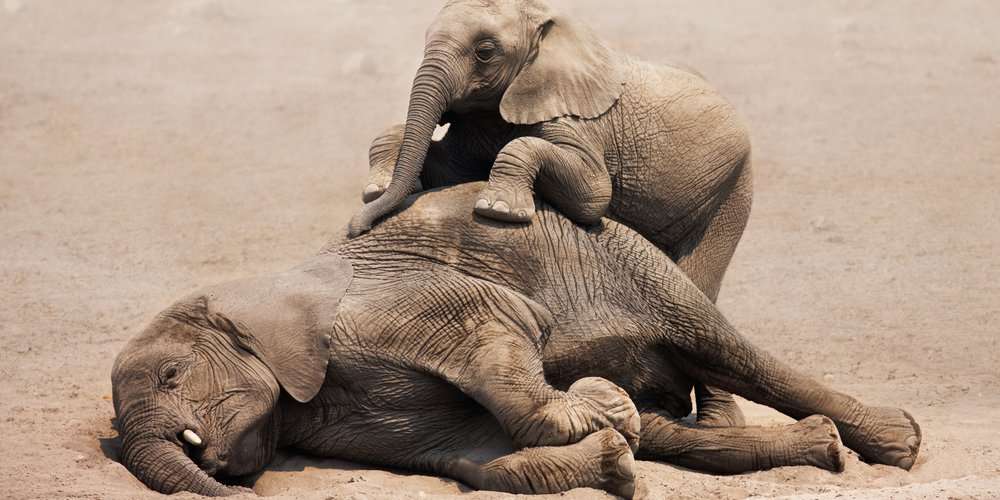Over time, many animals have adapted to their environments to avoid danger and natural predators.
It appears elephants have begun to adapt to being hunted by poachers for their tusks.
Currently, almost a third of the female elephant population in Mozambique does not have tusks.
Many animals really are masters of disguise, polar bears and arctic foxes being great examples. Both have adapted to blend into their surroundings as a response to predators.
However many animals have even more to worry about than being hunted out by other natural predators, as they're also hunted by humans — and as the elephant is seriously threatened by poachers, it seems they're adapting too.
Some believe ivory to have mysterious healing powers
Elephants are hunted and slaughtered for their ivory, with poachers often shooting at elephants from helicopters or small planes, allowing the elephants very little chance of defending themselves or escaping.
Read more: Global warming is making oceans so acidic, they may reach the pH they were 14 million years ago
The elephants are targeted for their tusks, which are said by some to have "restorative" or healing powers.
Despite having imposed a ban in late 2017, China is one of the nations where ivory is still more sought-after — and sometimes worth more — than gold. Ground and ingested, it's touted not only as being a cure for numerous diseases, but also as a way of increasing virility, strength, and fertility.
Regardless of the fact that there's no scientific basis to back the use of powdered ivory in Western medicine, elephants' tusks are still traded for a considerable amount of money in many parts of Africa and Asia.
However, it seems "Mother Nature" is fighting back with a weapon of her own — evolution. As a recent piece published in National Geographic outlined, natural selection appears to be favoring elephants born without tusks.
Elephants are evolving new adaptations to poaching
According to National Geographic, scientists in Mozambique are now racing to get to grips with the genetics of elephants born without tusks, as well as the outcome of the trait.
Previously, between 2% and 4% of all the female elephants in Mozambique had no tusks but that figure has now soared to almost a third of the female elephant population.
Elephant behavior expert and National Geographic Explorer, Joyce Poole, explained that poaching has a clear influence on elephants — not only in terms of their population size but also in terms of evolution.
Hunting has given elephants that didn't grow tusks a biological advantage in Gorongosa, as Poole explained, because poachers focus on elephants with tusks and spare those without.
By the the early 2000s, 98% of the approximately two hundred female elephants had no tusks. As scientists write, this is clear evidence of the pressure from hunting and how it can now affect a population leading to incredible evolutionary adaptations.

newmindsets on November 23rd, 2018 at 02:29 UTC »
I was gonna comment on how "is it really evolution if we are just unnaturally killing all of the elephants and by miracle leave the ones who don't grow tusks alone" but then I realized that we are just a predator and that is literally evolution in action if not at an amazing pace. Then I realized that everything unnatural we do and create is actually natural in a way because us and our minds are just a product of the natural universe. Then I realized that I'm really high
EctoSage on November 23rd, 2018 at 00:33 UTC »
Reminds me of some bears in Europe. It's illegal to kill them while they are with their mothers, so naturally, the late bloomers have a greater chance of survival, and as such, are more likely to live long enough to reproduce. It's natural selection- but producing results counter to how it worked in the past.
It's quite interesting, that in ages past, the animal with the greatest strength, or in the elephants case, tusks, has the best chance of survival. We have flipped the system on its head. The most peaceful, least intrusive, and yet not particularly striking animals, now have the greatest chance of survival.
Look at US hunting, a big beautiful deer, with an incredible set of antlers, is far more likely to eat a bullet than one lacking such features, and even more likely to survive if slightly deformed. In cities, small scavenging birds are thriving, yet don't cause enough trouble to be hunted, nor look good enough to be kept as pets, or killed and stuffed.
In another 100-200 years, what might these, and other species, look like?
ImJustReadingStuff on November 22nd, 2018 at 21:48 UTC »
Maybe they will settle things with debates and some day, democracy.